
Something that my mother used to say, fairly often about me, is that I'm violent about getting (emotionally) healthy and maintaining my peace of mind. While it is a bit of a play on words (you know, being "violent" in order to "keep the peace"), I won't lie…she is exactly right. The older—and prayerfully wiser—I get, the more I tend to repel anything that is counterproductive in my world.
On the heels of that, the more I study about how stress plays a direct role in illnesses like heart disease, diabetes, depression, obesity, and even premature death, the more intentional I am about maintaining my overall health and well-being. A part of that means keeping my stress levels low.
Take the stress hormone known as cortisol, for example. While this steroid hormone plays a significant role in increasing our body's metabolism, controlling our blood pressure, and reducing how much inflammation our system produces, it can cause all sorts of health-related issues when it's out of balance. When your cortisol levels are too low, that can result in things like fatigue, muscle weakness, and weight loss. When it's too high, that can ultimately lead to weight gain, irregular periods, acne, mood swings, slow healing (especially when it comes to your skin), headaches, and high blood pressure.
While rest, exercise, and meditation are a few ways to naturally increase your cortisol levels, if yours tilts towards the higher side, there are foods that you can eat to naturally decrease them too. So, if your period has been a little erratic lately or your blood pressure has been a little higher than usual, after seeing your doctor (for a clear diagnosis), consider adding some of the following foods to your diet.
As you're about to see, they are proven to be good for you on so many levels, including when it comes to getting your cortisol levels back on track.
1. Blueberries

If you like to snack on blueberries, you are definitely doing your body good for a myriad of reasons. Blueberries are high in vitamins C and K. Blueberries contain anthocyanins, which have anti-inflammatory, anti-viral, and anti-cancer compounds in them. Blueberries also contain calcium and iron to keep your bones healthy, fiber to aid in healthy digestion, and properties to help your brain maintain its short-term memory.
The reason why blueberries are great for decreasing your cortisol levels is that they are low in sodium and high in magnesium. The balance of both of these plays a direct role in keeping your blood pressure in check, which is always a good thing.
Blueberries Tip: You can keep blueberries from molding while helping them to last longer by adding a cup of white vinegar to three cups of distilled water. Let your fresh blueberries soak in the solution for 10 minutes, then drain them, run them under cold water, and dry them with a couple of paper towels. Then all you have to do is store them in a sealable container, place them in the fridge, and they can easily last for up to two weeks.
2. Black Tea

Black tea is a really great drink. It contains the antioxidants theaflavins and thearubigins, which are able to strengthen your immune system and help to keep diabetes at bay. Black tea also has flavonoids that can help keep your heart strong. Some other cool things about black tea is it's able to remove bad bacteria in your gut, it has compounds that can lower your blood pressure, and there are properties in it that can reduce your risk of having a stroke by as much as 21 percent (if you drink a cup of black tea per day).
The reason why it makes this particular list is because, when elevated cortisol levels result in a rise in your heart rate, consuming black tea can decrease the cortisol in your system by as much as 47 percent. Pretty impressive, indeed.
Black Tea Tip: Not the biggest fan of how black tea tastes? Try Food Network's Honey Citrus Southern Iced Tea recipe here.
3. Cannellini Beans
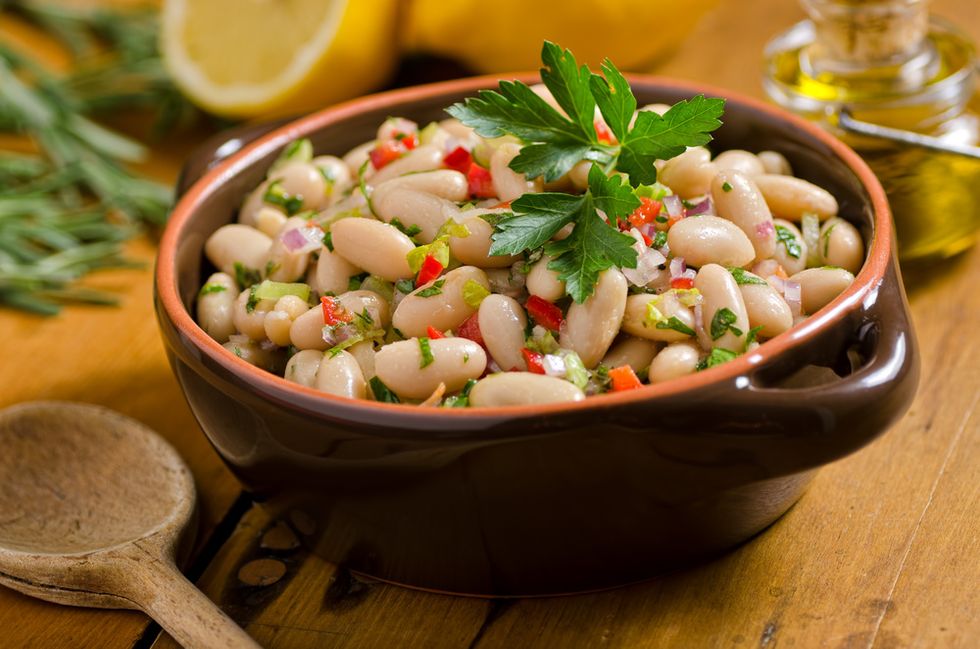
Never heard of these types of beans before? Basically, they are white beans that are super popular in Italian, Greek, and French cuisines. Because cannellini beans are considered to be a macronutrient that is high in protein, iron, potassium, and calcium, yet doesn't contain any amount of fat, I'm pretty sure you can see why they are top of the list of being a dietary recommendation.
As far as health benefits go, cannellini beans help to lower blood sugar and blood pressure levels, reduce free radicals and body inflammation, so it makes total sense why you should pick some up if you want to keep your cortisol levels in check.
Cannellini Beans Tip: Put a new twist to cannellini beans by making some Cannellini-Bean Pasta with Beurre Blanc. You can get step-by-step instructions here.
4. Dried Apricots

If you're looking for more healthy snacks to add to your diet, how about some dried apricots? They are low in calories while being high in fiber, calcium, and magnesium. Since dried apricots also have a good amount of vitamin A in them, they are able to boost your immune system, encourage cell growth, maintain your vision, strengthen your bones, and even assist in healthy embryonic development if you happen to be pregnant. Something else that dried apricots have in them is potassium.
When cortisol levels are elevated, a decrease in potassium comes as a direct result (this results in fatigue, muscle cramps, mood swings, heart palpitations, and breathing difficulties). Eating foods with potassium in them can help restore the potassium in your body that has been lost.
Dried Apricots Tip: If you want to take a stab at making some apricot fruit roll-ups, Natasha Kitchen's website has your back. Check out "How to Make Apricot Fruit Leather" to get the recipe.
5. Holy Basil

Here's what's a trip about holy basil—it's literally an adaptogenic herb. What that means is it's the type of herb that helps your body to build up a resistance to stressors that might try and attack your body. Holy basil is antibacterial, antiviral, antifungal and anti-inflammatory. Because of this, it increases energy levels, lowers inflammation, improves brain function, strengthens organ function, and yes, balances out your cortisol levels.
Just make sure that you don't give it to infants or children (studies on its safety for them are on-going) and that you only take it for six weeks at a time, should you choose to use it in supplement form. The reason why is because holy basil is so potent that it's not a good idea to take larger quantities without taking breaks in between.
Holy Basil Tip: How should you store this fresh herb? First, make sure to clip the ends of it. Then, place the herb into a glass jar or vase. Cover up the jar and store it in the refrigerator. It will last for a week if you do. Or, you can cut up the leaves of the herbs, put them into ice trays that are filled with water. If you then transfer the cubes to a large resealable plastic bag, the cubes can keep for up to a year.
6. Mangoes
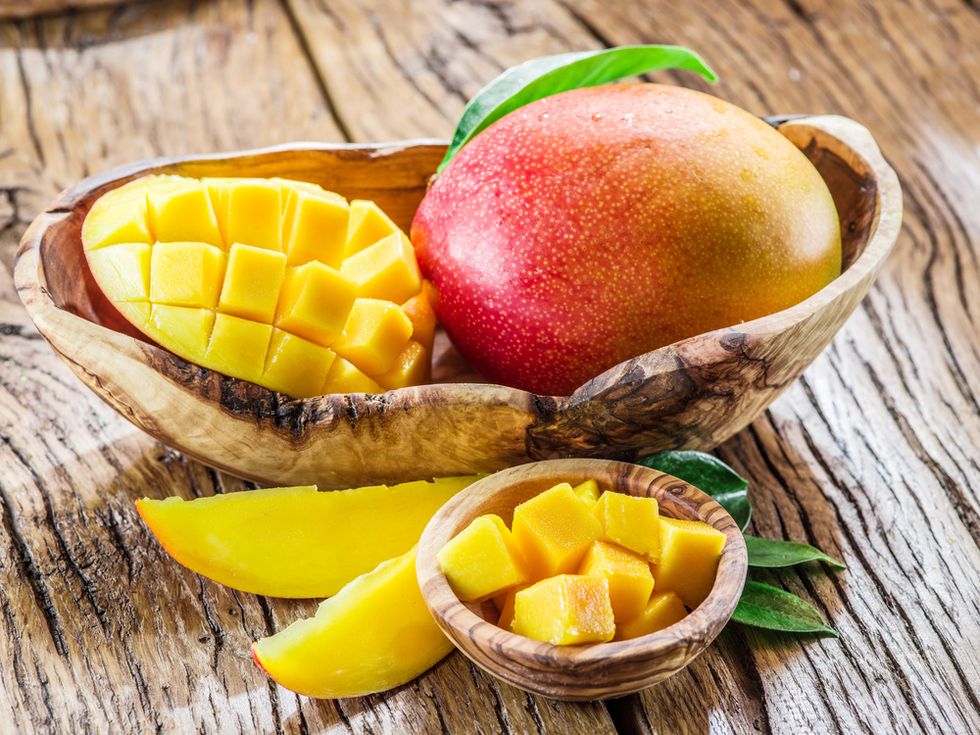
Mangoes are as good for you as they taste. They are high in antioxidants, the combination of vitamins A and C can help to keep your skin clear, and, because they are on the lower end of the glycemic index scale, this means that they can tackle the sweet cravings you might have if you happen to be diabetic.
If high cholesterol is something that you struggle with, mangoes can assist with that, too. How? Well, since they are a fruit that contains high levels of fibre pectin, mangoes are able to reduce the cholesterol in your system that can lead to plaque in your blood vessels, which can ultimately restrict blood flow to your heart.
Mangoes Tip: Sick of mangoes turning brown quicker than you can finish eating them? If so, once you slice a mango up, put the slices into some fresh lemon juice. The acid will slow down the browning process without interfering with the taste of the mango itself.
7. Olive Oil
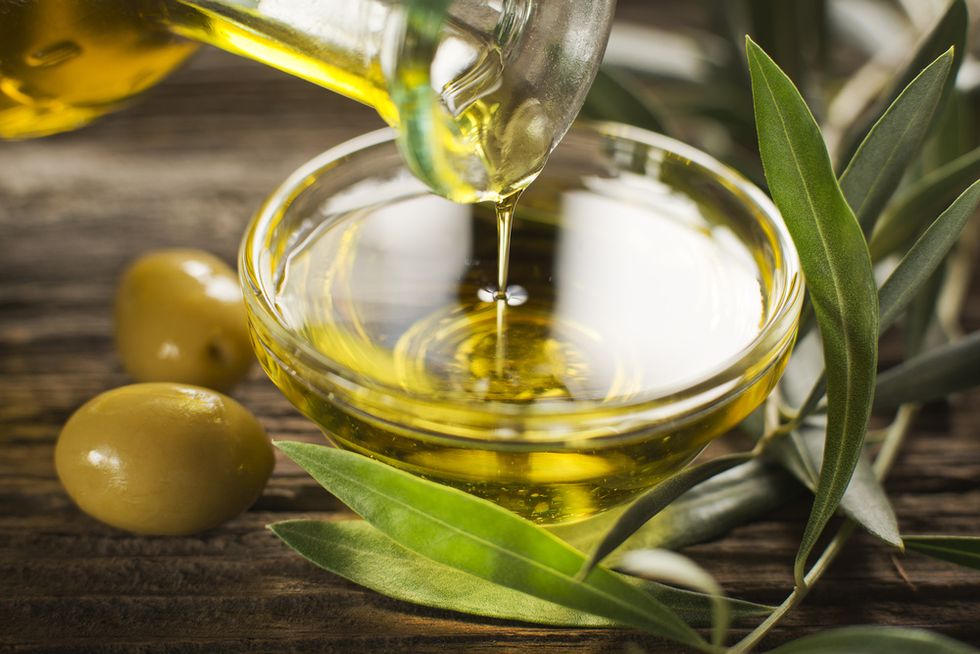
Out of all the different kinds of oil that you have to choose from, you should definitely have olive oil in your kitchen pantry. It's loaded with omega-6 and omega-3 fatty acids, antioxidants, and it has anti-inflammatory properties in it. Also, unlike a lot of other oils that can do the opposite (of what I'm about to say) over time, studies reveal that olive oil can help to prevent heart disease and strokes, fight off cancer cells, effectively treat rheumatoid arthritis, plus it does not lead to weight gain. As a bonus, because olive oil contains the compound oleuropein, it can lower cortisol levels too.
Olive Oil Tip: There are basically three different kinds of olive oil— refined, virgin, and extra virgin. If you want to consume the one that has the most health benefits, it's best to go with extra virgin olive oil. That's because it is the least processed and refined.
8. Salmon
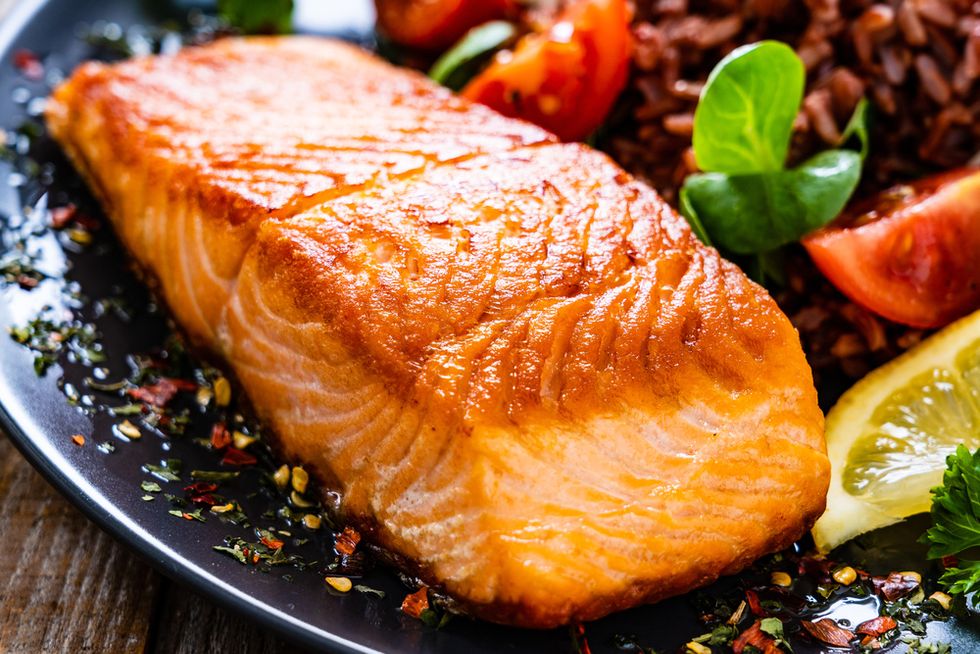
Salmon is probably my favorite kind of fish. I like that it's not super fishy in taste and has a light texture. Anyway, I always feel good whenever I eat it because I know that it's looking out for my physical health whenever I do. Salmon is rich in omega-3s, B vitamins, and protein.
It's also high in potassium, selenium (a mineral that protects your bone health and your thyroid,) and astaxanthin. Astaxanthin is a compound that reduces oxidation in your system. As a result, it can help to keep your cortisol levels from getting out of control.
Salmon Tip: If you want to get the most nutritional benefits from eating salmon, try poaching it. Poaching pretty much consists of placing salmon filets in a shallow saucepan, along with water, wine, or bone or vegetable broth for about 10 minutes; just enough for the salmon to not be raw without being overcooked.
If you want to check out a video on how to prepare salmon this way, click here.
9. Walnuts
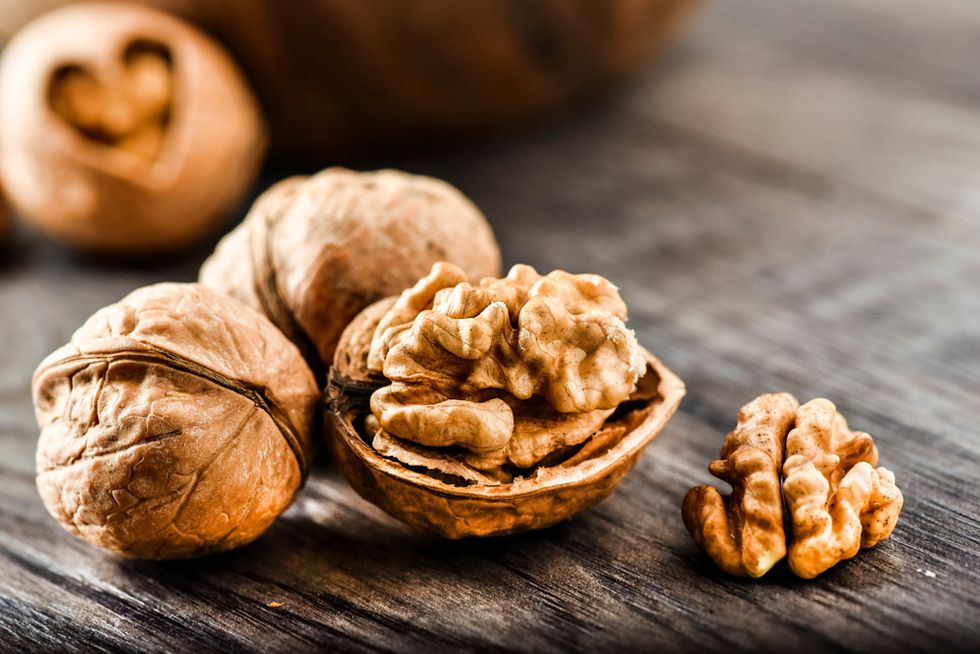
As far as nuts go, walnuts are packed with all kinds of health benefits. Not only are they also a food that are high in antioxidants, but they are a great source of omega-3, selenium, calcium, zinc, and vitamin E. If you're looking for a food that promotes a healthy gut, lowers your risk of having type 2 diabetes, and even helps your body to age gracefully, walnuts can handle all of this.
Because these are the types of nuts that significantly decrease oxidative stress to your system, they are something else that you can eat to get your cortisol levels down, too. Very cool.
Walnuts Tip: Have you ever wondered how to caramelize your own walnuts? All you need to do is put one cup of walnuts, ¼ cup of brown sugar, and one tablespoon of butter into a non-stick skillet. Over medium heat, stir the nuts and the mixture together for about five minutes. Then transfer the nuts to parchment paper, making sure to separate the nuts so that they don't stick together. Allow the mixture to cool for 10 minutes, and then your nuts will be ready to eat. Enjoy!
Let’s make things inbox official! Sign up for the xoNecole newsletter for love, wellness, career, and exclusive content delivered straight to your inbox.
Featured image by Shutterstock
Originally published on June 7, 2020
- 8 Foods That Keep You Calm And Relaxed - xoNecole: Women's ... ›
- How To Take Care Of Your Gut - xoNecole: Women's Interest, Love, Wellness, Beauty ›
- 10 Foods That Will Keep You Cool During The Heat - xoNecole: Lifestyle, Culture, Love, Wellness ›
- Bone Broth Soups In A Mason Jar TikTok Recipes Benefits - xoNecole: Lifestyle, Culture, Love, Wellness ›
- How To Lower Cortisol: Natural Ways To Lower Cortisol - xoNecole ›
This Is How To Keep 'Holiday Season Stress' From Infecting Your Relationship
Hmph. Maybe it’s just me, but it seems like there is something really weird happening in the fall season air (because winter doesn’t officially begin until December 21) that cuddle season is in full swing while break-up season is as well. In fact, did you know that break-ups are so popular during the holiday season that December 11 is deemed Break-Up Day?
The reasons why relationships shift around this time vary; however, I did both roll my eyes and chuckle when I read that a very popular one is because it’s an easy way to get out of getting one’s significant other a Christmas present. SMDH.
Anyway, I personally think that the less shallow folks out here may contemplate calling things “quits” or they at least distance themselves a bit from their partner (and what I’m referring to is serious relationships) due to all of the stress and strain that oftentimes comes with the holidays whether it be financial, familial, due to their tight schedules or something else.
Listen, I would hate for you and your man to miss the fun and happiness of experiencing this time of year, all because you are so overwhelmed or irritated that you can’t really enjoy it. That’s why I have a few practical tips for how to avoid allowing the typical holiday season stress from INFECTING your relationship.
Manage Your Expectations
 Giphy
GiphyUnmanaged expectations. If there is a main reason why the holiday season tends to be so stress-filled for so many people, I’d bet good money that this is the cause. And when you’re in a long-term relationship, expectations can manifest themselves in all sorts of cryptic and/or unexpected ways. You might have relatives who assume that you are going to be with them for Thanksgiving or Christmas when you have other plans in mind. You might be thinking that you are going to spend one amount for presents while your man is thinking something totally different. When it comes to scheduling, your signals may be crossed.
And you know what? To all of these scenarios, this is where clear and consistent communication come in. Don’t assume anything. Don’t dictate anything either. From now until New Year’s, mutually decide to check in once a week, just to make sure that you are both on the same page as it relates to the holidays and what you both are thinking will come along with it. The less blindsided you both feel, the less stressed out you will be. Trust me on this.
Set (and Keep) a Budget
 Giphy
GiphyOkay, so I read that last year, 36 percent of Americans incurred some type of holiday-related debt. Hmph. Last year, there was still some sense of normalcy in this country, chile, so I can only imagine what finances are gonna look like over the next several weeks. That said, since I don’t know a lot of people who don’t find being broke stressful, make sure that you and your bae set a budget and then stick to it this year — no ifs, ands or buts.
Because really, y’all — it doesn’t make sense to deplete savings and/or max out credit cards for a few days of giggles only to be damn near losing your mind because you don’t know how to make ends meet come Dr. Martin Luther King, Jr. Day.
And by the way, this tip doesn’t just speak to things like food and gifts; I also mean travel. If it doesn’t make a ton of sense (or cents) to be all over the place this year — DON’T BE.
Keep Matthew 5:37 at the Forefront
 Giphy
GiphyIf off the top of your head, you don’t know what Matthew 5:37 says, no worries, here ya go: “But let your ‘Yes’ be ‘Yes,’ and your ‘No,’ ‘No.’ For whatever is more than these is from the evil one.” That verse right there? Oh, it’s a boundaries lifesaver! I say that because do you see “maybe” or “I’ll think about it” in there? Nope. LOL. It says that you should tell people “yes” or “no” and leave it at that — and that complements Anne Lamott’s quote, “’No’ is a complete sentence” impeccably well. Yeah, you’ve got to remember that anything beyond a yes or no to a request is privileged information; you don’t owe anyone details or an explanation.
Besides, if you are really honest with yourself, when someone asks you something and you give a “Umm, let me think about it” kind of reply, more times than not, you already know what your answer is going to be — so why not let you both off of the hook? Give your response. Commit to that. And let everyone (including yourself) get on with their lives and schedules.
I promise you that when it comes to those holiday parties, you are pissing more folks off by not RSVP’ing or doing so and not showing up than just saying, “Thank you but not this year” off the rip.
Remember That Your Personal Space Is Privilege Not a Right
 Giphy
GiphyA friend of mine recently bought a new house and invited me over to come see it. He’s a single man with no children, so as I was taking in all of the space that he had, especially as I walked through his finished basement, I joked about relatives coming to live with him. “Hell no” and “absolutely not” were pretty much his immediate responses as he went on to say that some folks even had the nerve to be offended when he told them that he had no intentions on taking DNA in.
Ain’t it wild how people think that your stuff is their right? And yes, that brings me to my next point. Your home is your sanctuary space. If you want to host folks this year — cool. If not, ALSO COOL. Please don’t let folks (family included) guilt you into how they want you to act or even into what they would do if the shoe was on the other foot. You are not them — and as one of my favorite quotes states, “If two people were exactly alike, one of them would be unnecessary.” (A man by the name Larry Dixon said that.)
Hell, my friends? They know that I am good for sending them random things that they need or even want all throughout the year. Coming over to hang out at my pace, though. Uh-uh. Chalk it up to being a card-carrying member of the ambivert club yet I like keeping my living space personal — and I sleep like a baby, each and every night, for feeling that way.
Always remember that your space, your time, your resources, your energy and shoot, yourself period (including your relationship), are all things that are your own. You get to choose how, when and why you want to share them. The holiday season is certainly no exception.
Cultivate Some “You Two Only” Traditions
 Giphy
GiphyIt’s not uncommon for some couples to hit me up after the holiday season to “detox.” Sometimes it’s due to the financial drama (and sometimes trauma) that they experienced. Sometimes it’s because they allowed their relatives (especially in-laws) to get more into their personal business than they should’ve. More than anything, though, it tends to be because they didn’t get enough quality time together and so ended up feeling “disconnected.”
Please don’t let that happen. Listen, I’m not even a holidays kind of woman and yet, I will absolutely sit myself down with some hot chocolate and chocolate chip cookies to enjoy a Hallmark holiday film or two. Aside from the fact that most of them are lighthearted and sweet, I also like that they usually focus on couples loving on each other amidst all of the holiday beauty and ambiance — which is something that all couples should set aside some time to do.
Maybe it’s a vacation. Maybe it’s a staycation. Or maybe it’s my personal favorite, A SEXCATION. Whether it’s for a few days, the weekend or even overnight — don’t you let the holidays go by without setting aside time for you and your man to celebrate one another. Don’t you dare (check out “Are You Ready To Have Some Very Merry 'Christmas Sex'?”).
GET. SOME. REST.
 Giphy
GiphyI once read that 8 out of 10 people get stressed out over the holidays and 3 out of 10 lose sleep during to it — and when you’re stress-filled and sleep-deprived, that can absolutely lead to hypersensitivity, making mountains out of molehills and even not being in the mood for sex.
Your relationship can’t afford to go through any of this, so definitely make sure to prioritize rest. I don’t care how unrealistic it might seem during this time, sleep should never be seen as a luxury; it will always and forever be a great necessity.
That said, try to get no less than six hours of shut-eye in (check out “6 Fascinating Ways Sex And Sleep Definitely Go Hand In Hand”) and even ask your bae to take a nap with you sometimes (check out “Wanna Have Some Next-Level Sex? Take A Nap, Sis.”). Not only will sleep help to restore your mind, body and spirit but, when it’s with your partner, it’s an act of intimacy that can make you both feel super connected, even in the midst of what might feel like chaos.
___
Holiday season stress is real. Still, never give it the permission or power to throw your relationship off. Put you and your man first and let the holidays be what they are gonna be, chile.
Let’s make things inbox official! Sign up for the xoNecole newsletter for love, wellness, career, and exclusive content delivered straight to your inbox.
Featured image by Shutterstock
Whew. Did you know that somewhere around 122 million Americans travel during the holiday season? Listen, I went to see my godbabies this past September and got caught up in a crazy ass traffic jam at BNA (the Nashville airport) that damn near has me considering air travel ever again — especially during this time of the year.
Besides, it’s not like it’s a written rule that you have to travel over the holidays. In fact, if you want to play it chill this year, why not enjoy a staycation instead? Although it might seem like it’s a “poor man’s compromise,” as you’re about to see, it actually…isn’t.
1. Go All Out with the Christmas Décor
 Giphy
GiphyThere is someone I know who is so obsessed with Christmas, she’s damn near annoying-borderline-terrifying. I’m. Not. Kidding. Yet hey, if you’re going to do a holiday-themed staycation (emphasis on “holiday-themed”), that’s kind of how you’ve got to be. Some décor ideas include:
- A fresh Christmas tree (is the most ideal) that is ultimately decorated
- Wreaths on outside and inside doors
- Garland (with twinkle lights) in predictable and unpredictable places
- Poinsettias
- Mistletoes
- Snow globes
- A stocking (with some of your favorite things in it)
- Fake snow
- Stars
- Angels
- Candy canes
- A BLACK Santa (LOL)
I mean, since you are going to be spending a lot of time at home, it can feel like a mini-winter wonderland if you are intentional about doing more decorating to your living space than you ever have before!
2. Buy a Couple of Christmas-Themed PJs
 Giphy
GiphyWhile I was doing some research on a totally different topic, I happened upon an article that talked about the psychology behind why we should be intentional about what we wear to bed. When you stop to think about the fact that (hopefully) you are sleeping somewhere between 6-8 hours every night, it would make sense that things like the color and fabric of your sleepwear would have a real impact on you — even subconsciously.
Well, when it comes to Christmas décor, specifically, not only does it take you back to nostalgic memories, it can also boost your moods. So, aside from being on-10 with your Christmas décor, also invest in some Christmas-themed PJs. Since you’re going to be doing a lot of lounging around (RIGHT?), do it in something that makes you think about all of your favorite things about this time of year.
3. Cop Some Christmas-Scented Candles
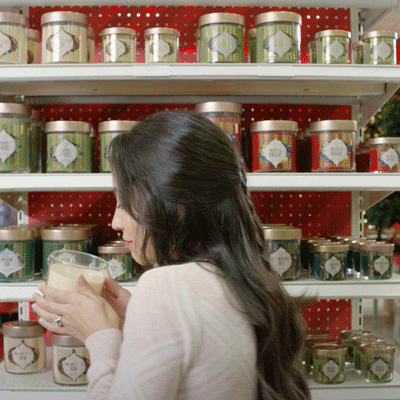 Giphy
GiphyThere really is no telling how many articles that I’ve written where I am singing the praises of scented soy candles. Candles are soothing, comforting and a very easy way to reduce stress. Also, since it gets darker quicker and for a longer period of time around this time of the year, candles provide a relaxing vibe to your home. Since it is Christmastime, go with scents that are reminiscent of the season:
- Cinnamon
- Vanilla
- Cranberry
- Apple
- Pine
- Frankincense and Myrrh
- Peppermint
- Cashmere
- Ginger(bread)
- Orange
- Sugar Cookies
- Sandalwood
- Cloves
- Cedarwood
- (Hot) Chocolate
Personally, one of my favorite candle companies is Goose Creek. Their signature collections will have your entire house smelling like a high-end bakery. No exaggeration.
4. Play Some Winter-Themed ASMR Sounds
 Giphy
GiphyI’m from Nebraska and my mother was a New Yorker. So, if there is one thing that I like, it’s seasons and that includes snow during wintertime. Unfortunately, Nashville is cray-cray when it comes to that. If, where you live, the weather is all over the place too (which is why I think it’s insane that some people still give pushback to global warming) and you would like for it to at least seem like you are in your own winter wonderland — invest in some fake snow to strategically place around your home.
Oh, and don’t forget to turn on some winter-themed ASMR sounds too. YouTube has videos that run for hours on end that feature blizzards and howling winds that really can make you feel like you are in the midst of an ice storm.
5. Host a Holiday Movie Marathon
 Giphy
GiphyOne thing to remember about a staycation is it doesn’t mean that you have to be alone or that the only people who can participate are the ones who live with you. Since a staycation is simply about staying close to home instead of traveling afar — absolutely consider having some of your favorite people over for a holiday-themed movie marathon. Shoot, Black America Web even did you a solid by publishing “25 Best Black Christmas Movies Of All Time;” plus, Tubi has a Black holiday hits section of indie films too.
Oh, and make sure to get creative with the Christmas-themed snacks. Some ideas? Some Kentucky-fried turkey tenders with cranberry hot sauce (recipe here), some Holiday Hot Spinach Dip (recipe here), some Grinch Kabobs (recipe here), some roasted pecans (recipe here) and some Pomegranate Guacamole (recipe here).
6. Spend a Night (or Two) at a Hotel or Vacation House
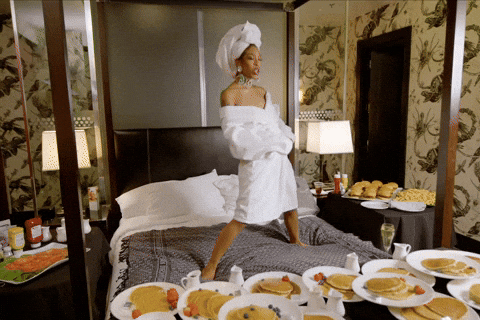 Giphy
GiphyJust like you don’t have to be alone during a staycation, you also don’t have to be cooped up in your house the entire time. Get a change of scenery in your own city by spending the night in a hotel that you’ve always wanted to try out or renting a vacation house for you and some of your folks to hang out in during the time between Christmas and New Year’s Day. I have a “love little sister” who does this randomly when she needs a break from her work as a therapist. She says that it’s damn near like taking a trip (and she has PLENTY of passport stamps; trust me).
7. Have Brunch or Dinner at a Christmas-Themed Restaurant
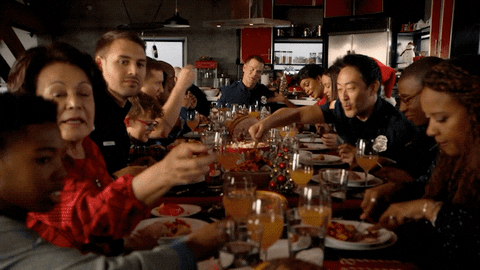 Giphy
GiphyIf nothing puts a bigger smile on your face than the thought of DoorDashing meals and barely even touching your stove during your staycation — hey, I am right there with you. Do consider going out to brunch or dinner during your chill time, though. It’s another way to bond with people and create some current holiday memories. And if you’ve got a bae and you opt for dinner, it can be a wonderful type of Christmas-themed date.
8. Go to a Holiday-Themed Concert
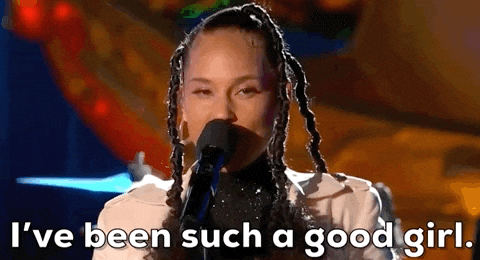 Giphy
GiphyBeing that I got my start as an entertainment writer, hear me when I say that I’m not someone who just has to go to a live concert every chance that I get. Oh, but baby, when I saw that El DeBarge was doing a City Winery tour and he was going to be here right before Christmas — I booked myself a ticket quick, fast and in a super-duper hurry! Shoot, I didn’t even want to go with someone because I plan to give him and that falsetto voice of his my complete and undivided attention. LOL.
I don’t know what it is about the holiday season that makes live music that much more enjoyable — but if there is a concert that features one of your favorite artists happening right through here, consider that to be a cool way to “tour your city” while cultivating a really awesome memory at the same time.
9. Also, Go Ice Skating
 Giphy
GiphyOne of my fondest memories of time with my father is going ice skating. We actually would do it in the summer (because that is when I would visit him) and, every year, he would get me a new ice skating outfit. Even now, when I watch someone ice skate (even in movies; like in the classic movie Garden State), I will have warm fuzzies.
Anyway, if you’ve never been before, go. If it’s been forever since you have, also go. There is something that is very sweet and so signature Christmas about it. Plus, it’s a top-tier form of exercise.
10. Take a Christmas Lights Tour
 Giphy
GiphyAnother one of my favorite Christmas memories is driving through neighborhoods and looking at the Christmas lights. And just like a Christmas concert can be a form of hometown touring, so can doing this if you decide to choose a couple of areas where you’ve never really been or rarely frequent.
Now are you excited about the thought of experiencing a holiday-themed staycation?
I thought you would be. ENJOY!
Featured image by Shutterstock









